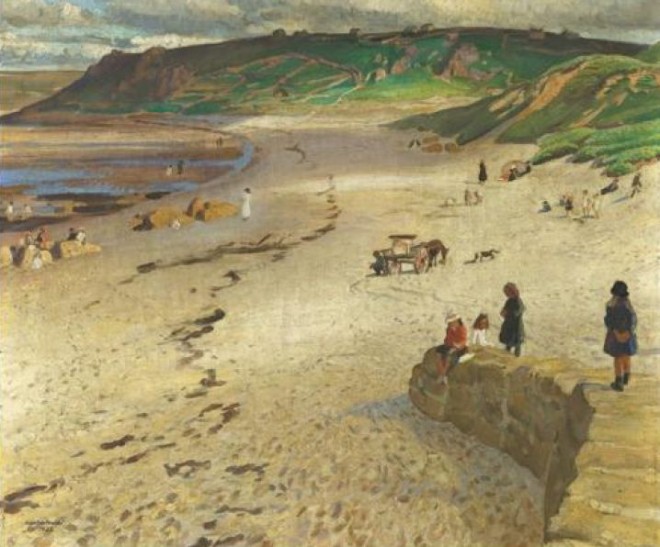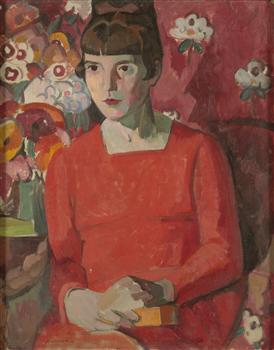I must start with an admission: I had never read anything by Katherine Mansfield before I picked up The Montana Stories. I knew a little about her life: born in New Zealand, died young of TB after a somewhat rackety life, married to John Middleton Murry, linked, loosely with Bloomsbury. I did wonder what place she had in the Persephone catalogue. Was she really a ‘neglected’ writer? Checking the British Library online catalogue, I found 387 entries. These include her own works, assorted theses and articles, biographies and critical works; 170 have been published since 1997; 24 in French, 8 in German, 3 in Italian, 1 in Hungarian, 1 in Portuguese, and 1 in Welsh. Not that neglected. But a straw poll of (reading) friends uncovered an ignorance similar to my own.

Is this another example of the resistance to short stories familiar to Persephone readers? But what an utter delight it has been to come to such a wonderful writer for the first time.
‘I couldn’t put it down,’ is my usual response to Persephone books, but this month I have felt quite the opposite. I repeatedly put down The Montana Stories to savour, and re-savour an atmosphere, an image, a sentence, a full stop even. I couldn’t bear to leave one story for the next, in case it should somehow be spoilt, clouded, like a new taste or a piece of music. And re-reading uncovered so much more, an aside, an ambivalent phrase – true, false, loving, cruel, telling, or maybe after all incidental, detail, a shaft of wit, a barely perceptible shift in voice from author to character. Children, adolescents, young couples, married women, and men, ageing spinsters, old men, even babies, and cats and dogs have their voices.
Katherine Mansfield looks with a cool (cold?) eye at life. Some literary critics have suggested that it is the eye of the permanent outsider, the unintegrated colonial. In her 1987 biography, comparing KM to Virginia Woolf, Claire Tomalin writes that, whereas Virginia’a people ‘inhabit a world of social, cultural and historical connection …. Katherine’s characters seem to inhabit a void…’ But surely this is not because of a failure to appreciate social or cultural connections: after all Katherine went to England first at the age of 14, and, apart from two short years in New Zealand between 1906 and 1908, spent the remainder of her life in Europe, largely in England. The New Zealand stories and the English/European differ principally not in the people but in the vegetation.

A powerful spirit of place pervades the long story ‘At the Bay’, but for the most part an interior, a house, a hotel, an office, a ship’s cabin, or a restaurant provide the sparse background to human dramas that go beyond specific cultural or historical connections. Relationships are examined, men and women, parents and children, rich and poor. Expectations are challenged: marriages are not necessarily based on love, not all widows are loyal to their husband’s memory, a man may be cruel to his wife and yet deserve sympathy, and, more shockingly, not all mothers love their children. ‘How mysterious and isolated we each of us are,’ wrote Mansfield to Lady Ottoline Morell. A desire to be understood, however strong, does not of itself generate understanding.
The young women yearn to be understood, and wrongly believe that they are. Laura’s coming of age in ‘The Garden Party’ is threefold: a man is killed during the course of the preparations, but the ‘grown-ups’ continue with the party – it was as her mother says ‘Not in the garden’ – ; she is invited to view the body, and finds the encounter not awful but ‘simply marvelous’. “Isn’t life -” But what life was she couldn’t explain. No matter. He quite understood.’ KM has slipped into free indirect speech. Her brother has not understood. It is an illusion. Laura will learn, like Fanny in ‘Honeymoon’, who worries that people misunderstand each other about the most important things of all. ‘”George, we couldn’t do that could we. We never could.” “Couldn’t be done” laughed George.’ A few eclairs later, at the end of an afternoons of chatter but little communication, a chasm opens between them. Fanny is overcome by the suffering in the wavering voice of the shabby singer, while George rejoices in his own contrasting good fortune. Bluff young men will never grasp the complexities nor fulfil the needs of their young brides, and later the women will not forgive them.

‘Oh, the relief, the difference it made to have the man out of the house. Their very voices were changed as they called to one another; they sounded warm and loving and as if they shared a secret.’ The three women in ‘At the Bay’ rejoice at the departure of poor ineffectual Stanley. Even the servant-girl senses the mood. ‘She plunged the teapot into the bowl and held it under the water even after it had stopped bubbling: as if it too was a man and drowning was too good for them.’ Not only does KM get Alice’s voice, she injects a note of comedy into the scene. One feels almost sorry for the teapot. The anthropomorphising of objects, plants and animals provide a rich unexpected vein of humour.
‘As for the roses you could not help feeling they understood that roses are the only flowers that impress people at garden parties.’ (‘The Garden Party’)
‘On the verandah there hung a long string of bathing dresses, clinging together as though they’d just been rescued from the sea …’ (‘At the Bay’)
‘The father and mother dolls, who sprawled very stiff as though they had fainted in the drawing-room …’ (‘The Doll’s House’).
Her descriptions are so absolutely right.
People morph into animals just as convincingly. ‘The sleek manager, who was marvelously like a fish in a frock coat, skimmed forward’ (‘The Honeymoon’) –that one word ‘skimmed’ is worth ten. And into objects: the old father with his ageing spinster daughters ‘might have been three bones, three broomsticks, three umbrellas bouncing up and down on the hard seats of the carriage’ (‘Father and the Girls’): it’s almost Dickensian. Even in the deeply sad penultimate story, ‘The Fly’, the grey-haired office messenger provides a moment of absurdity, dodging ‘in and out of his cubby-hole like a dog that expects to be taken for a run.’
Humour, pleasure and sorrow do co-exist. The first ball suggests the last. Young love contains the seeds of disappointment. Death hangs in the air, but reflection on it can turn to helpless laughter. Tragedy takes centre stage in a few stories, but more often is mentioned en passant, the death of a son at the Front indicated by a photograph that ‘is not new’. Sometimes it is all in the back-story, and contained in a word. In ‘A Married Man’ s Story’, the (bad?) husband introduces his wife, sitting in a low chair, ‘with her [my italics] little boy on her lap’. Later he asks if it is reasonable to expect his wife ‘a broken-hearted woman, to spend her time tossing her baby’, adding that she ‘never even began to toss when her heart was whole’ – cruel, dismissive, mysterious, and with a hint of a cold smile as the baby becomes for a second little more than a pancake.

Every story that is both a miracle of conciseness, rich with emotion while avoiding any sentimentality, and ringing with truth. Writing to William Gerhardi about ‘The Garden Party’, Katherine explains that Laura ‘feels that things ought to happen differently. First one and then another. But life isn’t like that. We haven’t the ordering of it …’ – a perfect sentence, which sticks so firmly in the mind – but ‘they do all happen, it is inevitable. And it seems to me there is beauty in that inevitability.’ What happens in her stories, and sometimes it is hard to say exactly what has happened, is never predictable but it is inevitable.
quotes … do share your favourites
‘The bush quivered in a haze of heat; the sandy road was empty except for the Trouts’ dog Snooker, who lay stretched in the very middle of it. His blue eye was turned up, his legs stuck out stiffly, and he gave an occasional desperate-sounding puff, as much as to say he had decided to make an end of it and was only waiting for some kind cart to come along.’ (‘At the Bay’)
‘There were glimpses, moments, breathing spaces of calm, but all the rest of the time it was like living in a house that couldn’t be cured of the habit of catching on fire, on a ship that gets wrecked every day.’ (‘At the Bay’)
‘It was dark on the Old Wharf, very dark, the wool sheds, the cattle trucks, the cranes standing up so high, the little squat railway engine, all seemed carved out of solid darkness. Here and there on a rounded wood-pile, that was like the stalk of a huge black mushroom, there hung a lantern, but it seemed afraid to unfurl its timid, quivering light in all that blackness, it burned softly, as if for itself. ‘ (‘The Voyage’)
‘I must confess that there does seem to me something sad in life. It is hard to say what it is. I don’t mean the sorrow that we all know, like illness and poverty and death. No, it is something different. It is there deep down, deep down, part of one, like one’s breathing. However hard I work and tire myself I have only to stop to know it is there, waiting. I often wonder if everybody feels the same. One can never know.’ (‘The Canary’)
If you have enjoyed this book, you might also enjoy:
Tell it to a Stranger by Elizabeth Berridge (Persephone Book No. 15)
Tea with Mr Rochester by Frances Towers (Persephone Book No. 44)
A Woman Novelist and Other Stories by Diana Gardner (Persephone Book No. 64)
The Closed Door and Other Stories by Dorothy Whipple (Persephone Book No. 74)
Midsummer Night in the Workhouse by Diana Athill (Persephone Book No. 92)
What other bloggers have said about this book:
When I read the introduction I was almost turned off again, upon learning that Mansfield would not have approved of the collection at all (because it included unfinished and unedited stories). However, I kept reading, and then I couldn’t stop reading. I think I may never write again, after reading her unpolished gems. I loved these stories more than anything else I’ve read by Mansfield–her prose absolutely sparkled, and I found myself desperate for more after each fragment. littlebookroom
You can read in this volume, the slyly perceptive A Cup of Tea and then turn to Mansfield’s journal to share her elation at having written and finished it in “about 4-5 hours”. Or share her feelings in her letter to Lady Ottoline Morrell about some of the stories (“I don’t think they’re much good”) that she wrote for a particular market “because it pays better than any other paper I know.” But read then, the delightful portrayals of life in ‘Sixpence’ or in ‘Mr and Mrs Dove’ and see for yourself how harsh a critic she was of her own work. redroom.com
